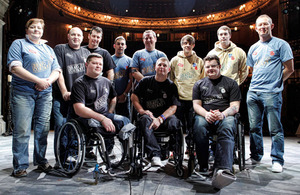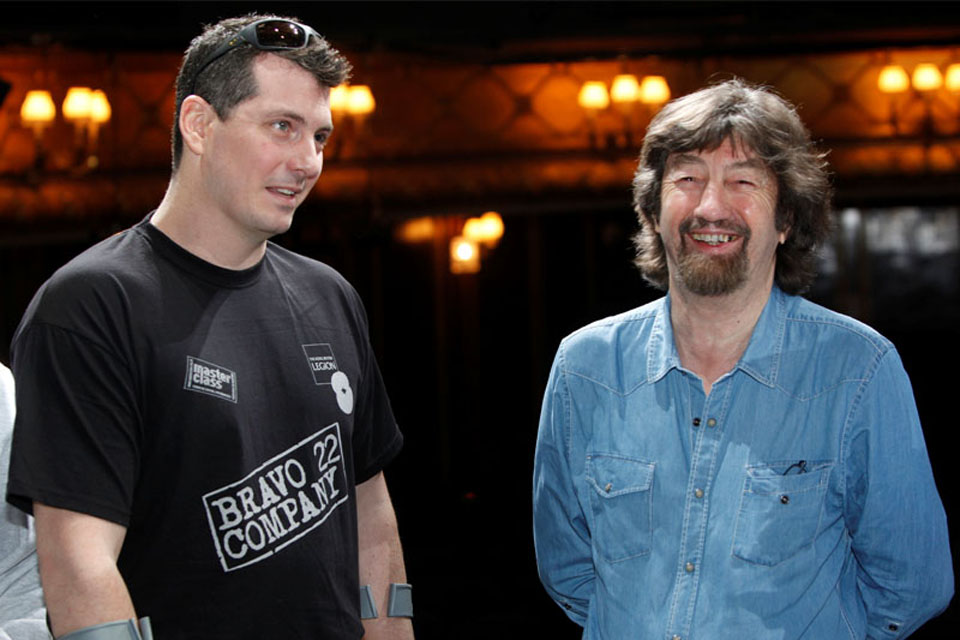Troops take to the West End stage
A remarkable group of wounded, sick and injured Service personnel will star on the West End stage this weekend.

Bravo 22 Company, a project for wounded, injured and sick Service personnel, currently in recovery capability programmes, have signed up to create, rehearse and perform 'The Two Worlds of Charlie F' at the Theatre Royal Haymarket [Picture: Corporal Ross Fernie RLC, Crown Copyright/MOD 2012]
They’ve all suffered brutal or life-threatening injuries, but a group of servicemen and women who paid a terrible price serving in Britain’s Armed Forces are back firmly on the road to recovery, thanks to a theatre in the West End.
‘The Two Worlds of Charlie F’ is a Service person’s view of injury and recovery. The play explores the consequences of both physical and psychological wounds, and the impact on others during the fight to win the new battle for survival at home while coming to terms with the cards that life has dealt.
Writer Owen Sheers interviewed each member of the newly-formed Bravo 22 Company and wrote his script by weaving in the personal experiences of the wounded, sick and injured troops who play theatricalised characters based on them. The result is a darkly comic, authentic and richly uplifting tale of survival.
One serviceman involved in the groundbreaking initiative is Marine Cassidy Little, 30, who lost his lower right leg when he was caught in an IED blast while on foot patrol in the Nad ‘Ali district of Helmand province, Afghanistan, last summer.
Marine Little, a Canadian, who serves with 42 Commando Royal Marines, joined the Armed Forces as a challenge after leaving university in the US and moving to London. In the aftermath of the bomb blast, he told a young medic treating him, with gallows humour:
There goes my dancing years!
About a month into his recuperation at Headley Court, the Marine learned about the Theatre Royal Haymarket Masterclass Trust and their first project to work with wounded military personnel.
Marine Little said:
I got involved because I thought it would be a good laugh and it’s a distraction, because if I focus on the fact that my whole life has changed, it’s difficult. I’ve had setbacks here and there but they don’t seem as drastic as if I hadn’t got this.
The Marine was instantly drawn to the Bravo 22 Company project because he always had a lust for the stage. Talented and gregarious, he landed the star role of Charlie Fowler after pouring out his story to Owen Sheers ‘for about three hours’, and the writer instinctively knew he’d found his leading man.

Marine Cassidy Little, who was drawn to the Bravo 22 Company project because he always had a lust for the stage, with Sir Trevor Nunn [Picture: Corporal Ross Fernie RLC, Crown Copyright/MOD 2012]
About a dozen servicemen will act while others have designed the set, made costumes, and will man the sound and lighting equipment and help backstage.
Marine Little said:
When I got the final script before Christmas, I was like ‘Holy Smokes!’
But the self-assured Marine never once doubted his ability to pull it off:
I’m more than happy to jump in the deep end of just about any situation,” he said with obvious pride.
Marine Little firmly believes that the opportunity to act at the Theatre Royal Haymarket has provided a distraction that has been invaluable for his recovery:
You need it. Some people get distracted by their Xbox, unfortunately some people get distracted by medication or alcohol - we all look for distraction because nobody wants to sit down and stare at their stump.
Heart-warmingly, he thinks that the lure of the spotlight has provided the best medicine of all. Ask if there are any similarities between the world of acting and the military and Marine Little nods:
Huge. The director is the CO [Commanding Officer], the producer is the RSM [Regimental Sergeant Major], the stage manager is the OC [Officer Commanding], and the writer is the padre and provides guidance!
Early on, Bravo 22 Company were taken under the wing of Theatre Royal Haymarket’s artistic director, Sir Trevor Nunn, and patron, actor Ray Winstone, who, according to Marine Little, was a revelation:
Ray was absolutely brilliant,” he said. “I thought that coming into a room full of soldiers, he’d be playing the hard bloke - but he was incredibly kind and supportive and it mattered nothing that he was Ray Winstone and I was Cassidy Little.
We stood on the same stage and sat on the same couch,” he added, sounding a little star-struck.
On Sunday 22 January 2012, the troops will perform their play at the Theatre Royal Haymarket in central London over two back-to-back performances. Marine Little’s huge extended family will be flying over to support him, but ask him if he has any nerves and his composure slips a little:
Terrified!” he admits with a grin.
The Theatre Royal Haymarket Masterclass Trust teamed up with the Royal British Legion and the Defence Recovery Capability to put the project together and all proceeds will go to the Royal British Legion.
The project aims to use acting and theatre to boost confidence and help the servicemen and women back on the road to recovery.
The play was sparked by a brainwave of producer Alice Driver who wanted to stage a play that would draw individuals out of their recovery bubble, boost self-esteem and pull people out of their comfort zone.
With just 48 hours until curtain up, Alice feels ‘hugely emotional’ at the transformation of the novice actors into accomplished performers:
It’s going to be amazing and everyone will see what I believe is a brilliant piece of theatre,” she said. “But what makes it even more exciting is that the troops are performing their own stories which makes it even more powerful.
However, she points out that it has taken a lot of effort to turn the idea into reality:
It’s been a huge challenge,” said Alice, who worked hard to persuade the Defence Recovery Capability and Commanding Officers from the Personnel Recovery Units that acting ‘wasn’t an airy-fairy therapy’.
She also says that one soldier likened rehearsals to assembling a gun or a drill:
He told me ‘you just keep on doing it until it is perfect’.
Captain Anna Poole serves with 15 (North East) Brigade based at Catterick Garrison. She served on operations in Iraq in 2003/04 but her career was cut short when she was injured in Latvia in late 2005 competing in a luge (feet first down the bobsleigh track at breakneck speeds) for the Army and Great Britain.
Captain Poole’s injury eventually led to the amputation of her left leg last June - ‘the best decision I ever made’ - and she began studying for a degree while she recovered:
Sitting at home is a very difficult thing to do,” she said with admirable frankness. “You just stare at four walls and it’s very difficult to get motivated so going out and meeting people while coming to terms with injury is a real confidence boost.
Captain Poole’s Personnel Recovery Unit suggested that she get involved with Bravo 22 Company and now she has put her studies on hold to concentrate on rehabilitation:
You’ve got to get it right first time otherwise you’re stuck with bad habits for life,” she explained.
Captain Poole plays Army Captain Becky Robinson who loses a leg (albeit in a mine strike), which should be a walk in the park for such a ballsy young woman. The writer lent on the troops for inspiration and Captain Poole reveals that their characters mirror themselves:
We’ve all kept our regiments, our backgrounds, and obviously, in my role, I’m the ‘organiser’ who chivvies people to go kayaking down the Amazon,” she said.
Since she wangled a small role, Captain Poole reckons she hasn’t looked back:
It was different, I had no intention of acting, but I’m really enjoying it and now I really wish I had a bigger part.
In the flesh, Captain Poole sounds like a professional actress, a legacy of boarding school elocution lessions to iron out her broad Yorkshire accent. But unlike active service, military personnel recovering from injuries are all on first name terms:
When you go to rehab, everyone uses first names, and also in military sport rank doesn’t exist,” she said.
Otherwise if you’re on the hockey pitch and six Captains are playing, you can’t shout ‘Ma’am’, otherwise six people stop and say ‘who, me?’
But there is another more poignant reason:
Because of what we’re doing, we need to be in a relaxed environment because we don’t need the pressure and expectation linked with our rank,” explained Captain Poole.
When you’re in your own world of depression and pain, you’re a patient, and your responsibility is to recover in the best way that you can.
Back in November, Captain Poole and her fellow actors stood on stage at the Theatre Royal Haymarket, overawed at the challenge ahead:
But we stood on stage this morning and it was like, wow, we are different people,” said Captain Poole. “We are more confident and we are talking about things that we’ve never even shared with our families. People have come out of themselves and it’s been really cathartic.
I am really looking forward to it. It is great to feel enthusiastic about something again - it has been far too long.
With only matinee tickets left, the actors hope that the play will eventually tour the country and there has been no shortage of press interest in the troops’ resolve to overcome tragedy, pain and disability. It is also apparent that lifelong friendships have formed.
Clearly the troops have inspired the director, writer, producer and a handful of professional actors who generously gave unstinting support and encouragement, and will also perform in the play. But it is far from a one-way street and it’s obvious that the professional actors and troops bring out the best in each other:
They might say, just turn this way on stage, little things that you wouldn’t even think,” said Captain Poole.
I think they brought them in because they didn’t know if we could act and we didn’t know if we could pull it off,” she laughed.
But they’re a great bunch, they’ve really helped us along the way and are really good friends.
If it went on tour, we’d jump at it. Through acting, people have found a different person within themselves.